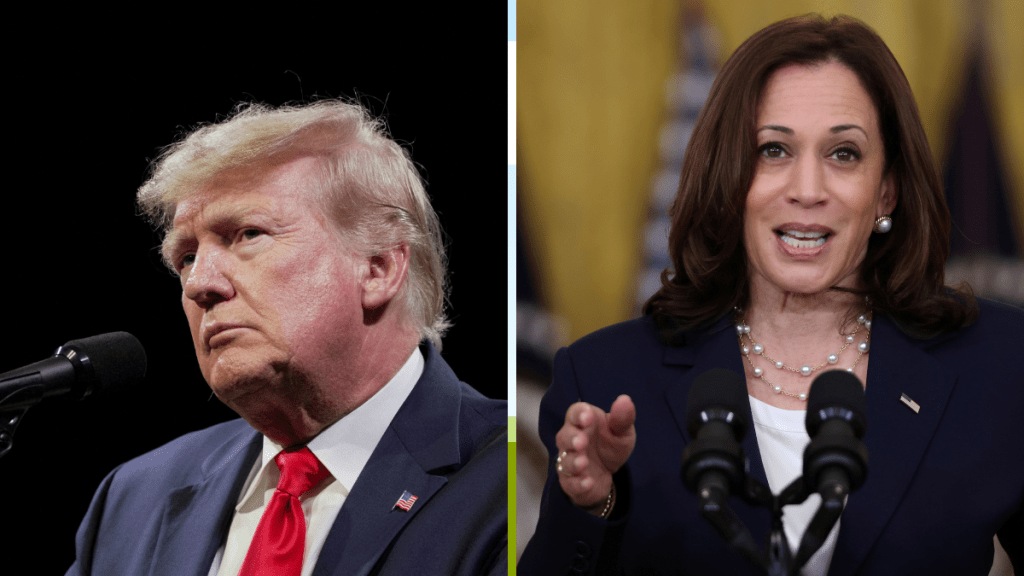Ahead of the US Presidential elections, Donald Trump and Kamala Harris are set to go head-to-head for the first—and possibly only—time in a highly anticipated presidential debate on Tuesday, September 10. The two candidates will vie for voter support on the nation’s most prominent political stage, with this debate coming just 75 days after President Joe Biden’s faltering performance led to a political upheaval that eventually forced him out of the race. While a similarly dramatic outcome is not widely expected this time, Trump is eager to end Harris’ political “honeymoon” as polls show the vice president either tied with or narrowly leading him in key swing states.
Harris, a seasoned former courtroom prosecutor, enters the debate with high expectations. She’ll face a Republican opponent who faces 34 felony convictions and has built a reputation for making false claims. The key question is whether Harris, who didn’t particularly shine in the 2020 Democratic primary debates, can effectively prosecute Trump’s many political vulnerabilities on live television, with millions of viewers watching.
The 90-minute Trump vs Harries Presidental Clash kicks off at 9 p.m. in Philadelphia’s National Constitutional Center and will be moderated by ABC News anchors David Muir and Linsey Davis. There will be no live audience, per an agreement reached by both campaigns.
Can Harris succeed where Biden failed?
Harris steps onto the debate stage with an advantage Biden did not have. In his June 27 debate, Biden struggled to deliver coherent arguments and fumbled several opportunities to press Trump on his liabilities—whether on abortion, the January 6th Capitol attack, or Trump’s extensive legal troubles. Many in the anti-Trump coalition were disappointed that Biden failed to capitalise on Trump’s weaknesses.
Harris is widely expected to perform better. Yet, despite the rich political terrain available, confronting Trump in a debate is easier said than done. Trump is a highly experienced debater, skilled at dominating television coverage, and he relishes a political fight. Harris recently hinted she’s ready for a battle, telling an audience in Atlanta, “Donald, if you’ve got something to say, say it to my face.” But can she follow through on her tough rhetoric? The world will soon find out.
Meanwhile, Trump’s lack of discipline and preparation has often been evident in his debate performances, which, like his governing style, rely more on instinct than on thoughtful analysis. While few expect a well-structured attack from Trump, he will need to do better than the scattershot approach he’s been using on the campaign trail.
Over the last few months, Trump has attacked Harris from multiple angles—questioning her racial identity, falsely labelling her a communist, and jabbing at her as a San Francisco liberal. He’s also highlighted her role in the Biden administration, reminding voters that she would likely continue Biden’s policies. This Biden connection is one Republicans believe Trump should lean into, with some suggesting he evoke Ronald Reagan’s famous debate quip, “Are you better off now than you were four years ago?” However, Trump’s tendency to make inflammatory statements may overshadow any coherent messaging.
Beyond the political issues, body language and tone will play a significant role in this debate, particularly given the gender dynamics. In past debates, Trump’s aggressive demeanour—like when he stood behind Hillary Clinton in 2016—was seen as off-putting by many viewers. With Harris, Trump will need to avoid gestures that could alienate suburban women and swing voters.
Harris, meanwhile, faces the challenge of navigating racist and sexist stereotypes. If she comes across as too angry, it could play into harmful tropes about Black women. On the flip side, Harris’ relative youth—she’s 59 compared to Trump’s 78—could be an advantage, especially given that age has been a significant talking point in recent elections.
Key policy battles: Abortion vs. Immigration
While personality often takes centre stage in debates, the candidates’ policy positions will also be crucial. Republicans hope Trump can make immigration the defining issue of the night, given the GOP’s sharp criticism of the Biden administration’s handling of the U.S.-Mexico border. For Harris, defending the administration’s record on immigration could be challenging.
Democrats, on the other hand, want the debate to focus on abortion. Trump’s appointment of three Supreme Court justices who helped overturn Roe v. Wade is a point of pride for him, but it’s a political liability among many women voters. Harris, as a woman, is far better positioned than Biden to deliver a powerful message on the issue, and Trump can’t afford to lose more ground with female voters.
Those familiar with Trump’s debate history warn that Harris should be prepared for the unexpected. Trump has a track record of ignoring political norms, saying and doing whatever he believes will benefit him in the moment. His unpredictability, while a potential risk for him, could also present a significant challenge for Harris, no matter how much preparation she’s done.
With the stakes higher than ever, Tuesday’s debate promises to be a pivotal moment in the 2024 presidential race. Whether Harris can hold Trump accountable and deliver a standout performance remains to be seen, but the night could shape the trajectory of the campaign for both candidates.
How to watch the debate
The debate will begin at 9 p.m. EDT on Tuesday and will last for 90 minutes. It will be moderated by World News Tonight anchor David Muir and Prime anchor Linsey Davis. The debate will be broadcast live on ABC News, as well as its streaming platforms ABC News Live, Disney+, and Hulu. Several other networks have also agreed to air the event live.
(With inputs from Associated Press)

